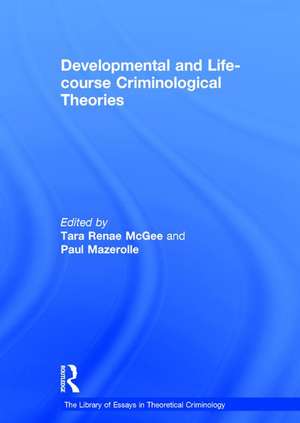Developmental and Life-course Criminological Theories: The Library of Essays in Theoretical Criminology
Autor Tara Renae McGee, Paul Mazerolleen Limba Engleză Hardback – 9 mar 2015
Preț: 1419.14 lei
Preț vechi: 1978.05 lei
-28% Nou
Puncte Express: 2129
Preț estimativ în valută:
271.56€ • 284.10$ • 225.58£
271.56€ • 284.10$ • 225.58£
Comandă specială
Livrare economică 12-26 martie
Doresc să fiu notificat când acest titlu va fi disponibil:
Se trimite...
Preluare comenzi: 021 569.72.76
Specificații
ISBN-13: 9780754629641
ISBN-10: 0754629643
Pagini: 536
Dimensiuni: 174 x 246 x 40 mm
Greutate: 1.27 kg
Ediția:1
Editura: Taylor & Francis
Colecția Routledge
Seria The Library of Essays in Theoretical Criminology
Locul publicării:Oxford, United Kingdom
ISBN-10: 0754629643
Pagini: 536
Dimensiuni: 174 x 246 x 40 mm
Greutate: 1.27 kg
Ediția:1
Editura: Taylor & Francis
Colecția Routledge
Seria The Library of Essays in Theoretical Criminology
Locul publicării:Oxford, United Kingdom
Cuprins
Contents: Introduction. Part I Key Theoretical Papers: The social development model: an integrated approach to delinquency prevention, J. David Hawkins and Joseph G. Weis; A developmental perspective on antisocial behavior, G.R. Patterson, Barbara D. DeBaryshe and Elizabeth Ramsey; Life-course desisters? Trajectories of crime among delinquent boys followed to age 70, Robert J. Sampson and John H. Laub; Life-course-persistent versus adolescence-limited antisocial behavior, Terrie E. Moffitt; The Integrated Cognitive Antisocial Potential (ICAP) theory, David P. Farrington; Situational action theory, Per-Olof H. Wikström, Dietrich Oberwittler, Kyle Treiber and Beth Hardie. Part II Tests of Theory: Problem behavior in the middle school years: an assessment of the social development model, Christopher J. Sullivan and Paul Hirschfield; Two routes to delinquency: differences between early and late starters in the impact of parenting and deviant peers, Ronald L. Simons, Chyi-in Wu, Rand D. Conger and Frederick O. Lorenz; Residential change as a turning point in the life course of crime: desistance or temporary cessation?, David S. Kirk; Delinquent development in a sample of high-risk youth: shape, content, and predictors of delinquent trajectories from age 12 to 32, Victor van der Geest, Arjan Blokland and Catrien Bijleveld; Exploring long-term and short-term risk factors for serious delinquency, André M. van der Laan, Martine Blom and Edward R. Kleemans; Does the effect of self-control on adolescent offending vary by level of morality? A test in three countries, Robert Svensson, Lieven Pauwels and Frank M. Weerman. Part III Debates and Challenges: A life-course view of the development of crime, Robert J. Sampson and John H. Laub; Offender classifications and treatment effects in developmental criminology: a propensity/event consideration, Michael R. Gottfredson; Participation and frequency during criminal careers across the life span, Hanno Petras, Paul Nieuwbeerta and Alex R. Piquero; Generality, continuity, and change in offending, Raymond Paternoster, Charles W. Dean, Alex Piquero, Paul Mazerolle and Robert Brame; Marriage and desistance from crime in the Netherlands: do gender and socio-historical context matter?, Bianca E. Bersani, John H. Laub and Paul Nieuwbeerta; Long-term crime desistence and recidivism patterns - evidence from the Essex County convicted felon study, Megan C. Kurlychek, Shawn D. Bushway and Robert Brame. Name index.
Notă biografică
Tara Renae McGee is Senior Lecturer in the School of Criminology and Criminal Justice, Griffith University, Australia and Paul Mazerolle is Pro Vice Chancellor (Arts, Education and Law) at Griffith University, Australia.
Descriere
The developmental and life-course perspective in criminology came to prominence during the late 1980s and this was followed in the 1990s by more theories to explain offending behavior. This volume brings together selected articles from the debates of these major theories, including key theoretical statements and empirical tests undertaken by researchers other than the original theorists. The collection not only surveys debates within the developmental and life-course perspective but also between this perspective and others within criminology.











